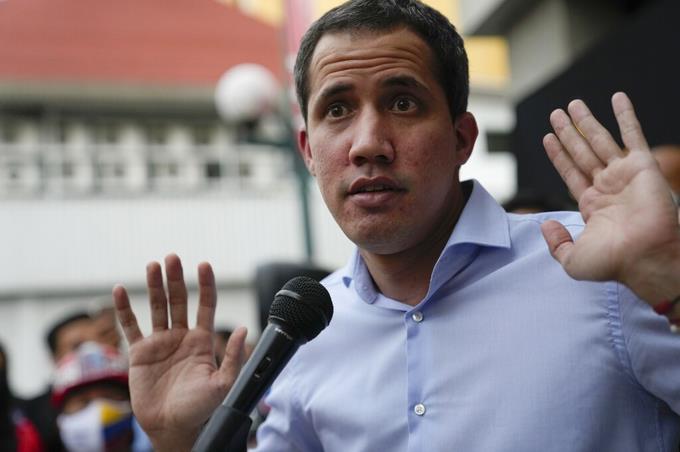Juan Guaido has no doubts that the opposition he leads in Venezuela will destroy a final election against President Nicolas Maduro, and this is where he is leading his efforts in the negotiation process in Mexico: to measure himself with him as soon as possible.
Guaido, 38, has been recognized as the president responsible for Venezuela by fifty countries, including the United States, who were unaware of Maduro’s 2018 re-election as fraudulent.
“I’ve said it since day one (…). If Maduro is afraid to measure himself with me, or if it’s anyone else… I don’t have a problem,” he challenges. “I also ask him to leave (the authority) and I leave (the so-called interim government), and to measure himself,” Guaido says in an interview with AFP in his Caracas apartment.
“The origin of the conflict is the lack of the 2018 elections, and the conflict is a usurpation of the executive authority… The election schedule that turns elections into a real solution to the conflict is part of the process,” he said.
Its biggest effort is focused on the presidential elections, scheduled for 2024, to be pushed as part of the dialogue table that began two weeks ago in Mexico, mediated by Norway, in which it uses the gradual lifting of the shards of international sanctions that have pressured it. Maduro’s government to sit down and negotiate.
Will you be the candidate? He answers, “We will have one candidate, a unit operation.”
Chavismo ruled out the progress of the presidential election for the time being. The opposition has the possibility to call an impeachment referendum next year, when the president’s half-term term ends.
“We can call it a presidential election, an impeachment referendum, and it would be a solution that addresses the non-election of 2018, which is owed to all Venezuelans,” he says.
He is confident that in “elections characterized by confidence and the least amount of credibility (…) the democratic alternative 80-20, 70-30 will win.” “I have no doubts,” he insists, dismissing opinion polls showing waning popularity.
Gone are the days when tens of thousands of people would gather in rallies across the country. The pandemic ended up cutting off his already worn out assembly capacity. In his house, which serves as his office, he is accompanied by two assistants and two bodyguards.
“There are no conditions”
When do you think the final presidential election should take place? Guaido replies: “Indeed, in December … obviously as quickly as possible.” “For Venezuelans, it is the presidential election that resolves the conflict.”
However, he is skeptical about participation in the elections scheduled for this year, for mayors and governors, organized by the new National Electoral Council (CNE) – with two opposition chiefs – appointed as part of the pre-Mexico internal negotiation process.
“There are no conditions for naming an event (November 21) elections, to the point where we discuss (in Mexico) political and electoral guarantees and conditions,” he says, describing the current National Electoral Council as a “guardian.”
But unlike previous elections, he avoided calling for an abstention. “It will be a mixture that seeks as much crowding, organization and unity as possible,” he says, without showing a clear position.
Will you vote on that day? “I haven’t decided yet.”
Regional elections in November exposed fissures in the opposition, as many leaders defected from the ranks to campaign against Chavismo’s fierce machinery and its already designated candidates.
The deadline for registration of nominations ends on Sunday.
“continuous contact”
Guaido maintains that his contact with the United States is “ongoing” even with the government of Democrat Joe Biden, which although he has maintained the support of his predecessor Donald Trump, does not share an “all or nothing” strategy.
It was Trump who led the international escalation of pressure on Maduro’s downfall, with sanctions including an oil embargo.
Punitive measures, unpopular among Venezuelans, have not diminished the power of President Chaveza, who maintains territorial control with the support of the armed forces, his main backer, and allies such as China, Russia and Iran.
For example, the Biden administration has welcomed the appointment of the new National Electoral Council, and has the option of lifting some sanctions if the Mexican negotiations succeed.
“For those who support Maduro,” he says, “there is no better option than an agreement ‘in Mexico’ because it implies a gradual lifting of sanctions.” The eventual failure of negotiations “will intensify the conflict, and there will be more pressure and more international accompaniment.”
Maduro last week called for a “direct dialogue” with Washington, including the return of business executives at the two countries’ embassies.
For Guaido, it is a “desperate cry for some kind of recognition”, and “resolving it” is a “free and just” choice. He concludes that “if the regime or Maduro wants some kind of recognition or legitimacy, they have to win it with votes.”

“Music buff. Social media lover. Web specialist. Analyst. Organizer. Travel trailblazer.”

:quality(85)/cloudfront-us-east-1.images.arcpublishing.com/infobae/TEQF6EONZRFGLLLDIDD4L2O4EE.jpg)

:quality(75)/cloudfront-us-east-1.images.arcpublishing.com/elcomercio/XU32LRAEZFDDPNVHLFU3CKVBYY.jpg)



More Stories
Sheinbaum, Galvez, Mainz campaign wrap-up, news and more
Sheinbaum and Mainz’s CDMX campaign wraps up: Road Alternatives and Street Closures
Ortega attacks Humberto Ortega and declares him a “traitor to the country”